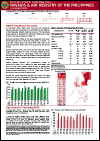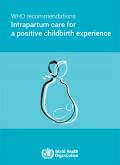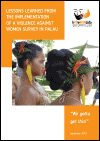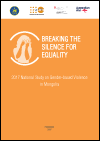What's New
Displaying results 1631 - 1640 of 4899

Resource | Fact Sheets,
In February 2018, there were 871 new HIV antibody seropositive individuals reported to the HIV/AIDS and ART Registry of the Philippines (HARP) [Table 1]. Sixteen percent (135) had clinical manifestations of advanced HIV infection (WHO clinical stage 3 or 4) at the time of diagnosis.

Resource | Publications,
The 2016-17 MDHS was the second DHS survey to be conducted in the Maldives in collaboration with the worldwide Demographic and Health Surveys Program. Fieldwork for the survey was carried out from 17 March 2016 to 27 November 2017 covering a national sample of over 6,000 households.

Resource | Publications,
When medically justified, a caesarean section can effectively prevent maternal and perinatal mortality and morbidity. However, there is no evidence to show that C-section delivery has any benefits for women or infants who do not require the procedure.

Resource | Publications,
Women are estimated to account for one third of the 275 million people who use drugs globally. Women who use drugs are consistently reported to have less access to harm reduction services and to be at higher risk of HIV and hepatitis C infection than men who use drugs. Despite these reports, robust data on this subject is scarce, and research on drug use and related health issues rarely produces information about women.
The Global State of Harm Reduction 2018 identifies a number of key issues and themes reflected across the world that limit women’s access to harm reduction services, and highlights cases of good practice.

Resource | Fact Sheets,
The first case of HIV infection in the Philippines was reported in 1984. Since then, there have been 52,280 confirmed HIV cases reported to the HARP. Ninety-three percent (48,873) were male and 3,396 (7%) were female; there were no data on sex for 11 cases. The median age was 28 years old (age range: 1 year - 82 years; no age data for 73 cases). More than half (26,757 or 51%) were from the 25-34 year age group while 14,655 (28%) were youth 15-24 years old. Seventy-eight percent (40,663) of all the 52,280 diagnosed cases in the Philippines were reported from January 2013 to February 2018.

Resource | Fact Sheets,
In October 2018, there were 1,072 new HIV antibody seropositive individuals reported to the HIV/AIDS & ART Registry of the Philippines (HARP). Nineteen percent (208) had clinical manifestations of advanced HIV infection (WHO clinical stage 3 or 4) at the time of diagnosis.

Resource | Fact Sheets,
In November 2018, there were 945 new HIV confirmed positive individuals reported to the HIV/AIDS & ART Registry of the Philippines (HARP). Eighteen percent (174) had clinical manifestations of advanced HIV infection (WHO clinical stage 3 or 4) at the time of diagnosis.

Resource | Guidelines,
This guideline is a consolidated set of new and existing recommendations on essential labour and childbirth practices that should be provided to all pregnant women and their babies during labour and childbirth irrespective of socioeconomic setting. It promotes the delivery of a package of labour and childbirth interventions that is critical to ensuring that giving birth is not only safe but also a positive experience for women and their families.
It highlights how woman-centred care can optimize the quality of labour and childbirth care through a holistic, human rights-based approach. By outlining a new model of intrapartum care that is adaptable to individual country contexts, the guideline enables substantial cost-savings through reduction in unnecessary interventions during labour and childbirth.

Resource | Publications,
Collecting reliable, comparable and comprehensive data measuring the prevalence, nature of and other factors associated with violence against women (VAW) is essential to ending this violence. VAW is an extremely sensitive topic that requires specialised research methods to ensure both the quality of the data collected and the safety of the researchers and interviewees. This document contains lessons learned from Umerang Imetengel’s experience as a research coordinator implementing the Belau Family Health and Safety Study in Palau, as documented in a series of interviews conducted after the data collection had been completed.

Resource | Publications,
The 2017 National Study on Gender-based Violence in Mongolia breaks down intimate partner and non-partner violence revealing violence for both lifetime and within the last 12 months. Furthermore, the study also gathers and reveals the data for the different forms of violence; physical, sexual, economic and emotional violence, and controlling behaviours.
The survey, interviewed more than 7,000 women – uncovering extremely high rates of intimate partner and non-partner violence against women across Mongolia.





